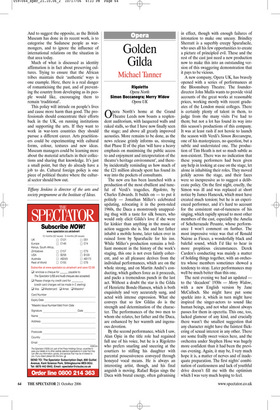Golden Gilda
Michael Tanner
Rigoletto Opera North Simon Boccanegra; Merry Widow Opera UK Opera North’s home at the Grand Theatre Leeds now boasts a resplendent auditorium, with lacquered walls and raked stalls, so that I have now finally seen the stage; and above all greatly improved acoustics. More remains to be done, as the news release grimly informs us, stressing that Phase II of the plan ‘will have a heavy emphasis on maximising the public access to and enjoyment and interpretation of the theatre’s heritage environment’, and thereby incidentally reminding us how much of the £21 million already spent has found its way into the pockets of consultants.
The new era has been launched with a production of the most ebullient and tuneful of Verdi’s tragedies, Rigoletto, by Charles Edwards. It builds on — to put it politely — Jonathan Miller’s celebrated updating, relocating it in the porn-ruled 1960s, the Duca a monstrously unappealing thug with a taste for silk boxers, who would only elicit Gilda’s love if she were far kinkier than anything in the music or action suggests she is. She and her father inhabit a mobile home, later taken over in ruined form by Sparafucile for his inn. While Miller’s production remains a brilliant moment in the history of the work’s staging, this one is not even faintly coherent, and so all pleasure derives from the individual performances, which are on the whole strong, and on Martin André’s conducting, which gathers force as it proceeds, and packs a tremendous punch in the last act. Without a doubt the star is the Gilda of Henriette Bonde-Hansen, which is both exquisitely and very accurately sung, and acted with intense expression. What she conveys that so few Gildas do is the strength and determination of the character. The performances of the two men to whom she relates, her father and the Duca, are enhanced by her warmth and ingenuous devotion.
By the second performance, which I saw, Alan Opie in the title role had regained full use of his voice, but he is a Rigoletto who prefers snarling and sneering at the courtiers to stifling his daughter with parental possessiveness conveyed through honeyed vocal means. He is always an interesting artist, though, and his final anguish is moving. Rafael Rojas sings the Duca with brutal energy, often galvanising in effect, though with enough failures of intonation to make one uneasy. Brindley Sherratt is a superbly creepy Sparafucile, who uses all his few opportunities to create a picture of principled evil. These and the rest of the cast just need a new production now to make this into an outstanding version of this swaggering demonstration that it pays to be vicious.
A new company, Opera UK, has bravely opened with a series of performances at the Bloomsbury Theatre. The founderdirector John Mullis wants to provide vivid accounts of the great works at reasonable prices, working mostly with recent graduates of the London music colleges. There is certainly plenty of talent in them, to judge from the many visits I’ve had to them; but not a lot has found its way into this season’s productions of this company. It was at least rash if not heroic to launch the season with Verdi’s Simon Boccanegra, one of his masterpieces, no question, but a subtle and understated one. The production of Tim Heath is not so much subtle as non-existent. There was no indication that these young performers had been given any help in looking at ease on the stage, let alone in inhabiting their roles. They moved jerkily across the stage, and their faces were so inexpressive as to suggest a deliberate policy. On the first night, cruelly, the Simon was ill and was replaced at short notice by James Hancock, which must have created much tension; but he is an experienced performer, and it’s hard to account for the consistent out-of-tuneness of his singing, which rapidly spread to most other members of the cast, especially the Amelia of Scheherazade Pesante, whose performance I won’t comment on further. The most impressive voice was that of Ronald Nairne as Fiesco, a wonderfully black and baleful sound, which I’d like to hear in more propitious circumstances. Derek Carden’s conducting was mainly a matter of holding things together, with an orchestra whose members sometimes showed a tendency to stray. Later performances may well be much better than this one.
The next evening we had an updated to the ‘decadent’ 1930s — Merry Widow, with a new English version by Jane McCulloch. She might have put some sparkle into it, which in turn might have inspired the singer-actors to sound like human beings, and not what almost always passes for them in operetta. This one, too, lacked glamour of any kind, and crucially there wasn’t the smallest suggestion that any character might have the faintest flickering of sexual interest in any other. There are some frailly sweet voices here, and the orchestra under Stephen Hose was hugely more confident than it had been the previous evening. Again, it may be, I very much hope it is, a matter of nerves and of inadequate preparation. The first nights’ combination of cautiousness and lack of youthful drive doesn’t fill me with the optimism which I was very much hoping to feel.


































































































 Previous page
Previous page